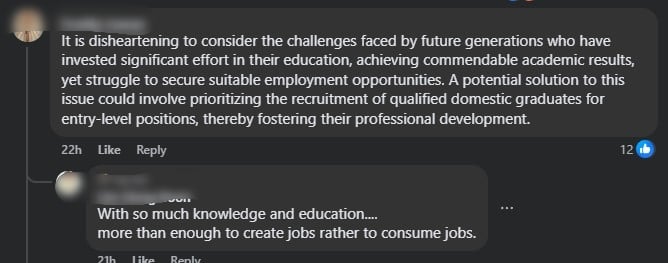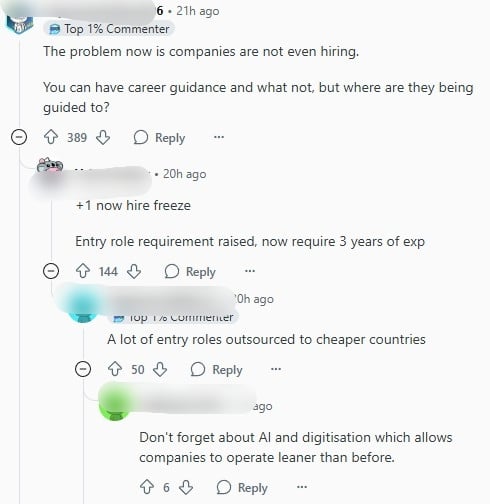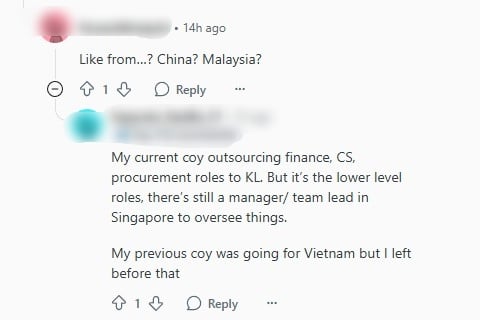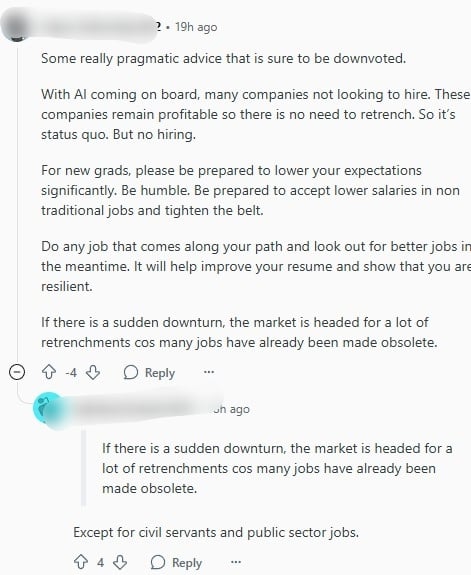Singapore’s fresh graduates are being urged to keep an “open mind” in their job search during uncertain economic times, but this message has drawn criticism from netizens who say it lacks actionable support.
The advice came during a press conference held on 10 July 2025, led by members of the Singapore Economic Resilience Taskforce (SERT), including Minister for Manpower Dr Tan See Leng and labour chief Ng Chee Meng.
They emphasised adaptability in the face of global economic challenges, assuring graduates that while the outlook may appear daunting, opportunities remain, especially in the public sector and emerging industries.
Ministers urge calm and flexibility from graduates
Speaking at the SERT briefing, Tan acknowledged widespread anxiety among young jobseekers entering the workforce.
He noted that economic uncertainty—fuelled by global instability and shifting hiring trends—has affected fresh graduates’ confidence.
“At the same time, I would really appeal to graduates and parents to stay calm,” said Tan. “We continue to see silver linings in the employment data.”
He cited encouraging statistics: the preliminary employment rate for the graduating class of 2025 stood at 51.9% in June, an improvement from 47.9% in the same month last year.
Tan reassured jobseekers that entry-level opportunities were holding steady, with the public sector offering 2,400 immediate vacancies in areas such as engineering and software development.
He added that a government-led public service career fair is scheduled for August.
Additional job avenues are expected to open in the care sector, green economy, education, and technology.
Support structures being enhanced
To assist young workers, Workforce Singapore has launched a career guidance service connecting jobseekers with industry professionals.
At the same time, Institutes of Higher Learning have strengthened career readiness programmes.
To complement these efforts, the government is temporarily enhancing funding for basic human resources certification, aimed at improving internal HR capabilities across organisations.
Tan called on employers to support young talent development, stating that the labour market remains resilient with more vacancies than jobseekers. He also asserted that the situation does not reflect a crisis or recession.
Identifying key challenges for youth employment
Ng Chee Meng expanded on four key challenges that young workers face: the skills gap, expectation gap, opportunity gap, and experience gap.
He explained that many graduates feel unprepared for evolving industries and often struggle to reconcile their career expectations with market realities.
Ng highlighted a recurring concern: many entry-level roles demand prior experience, placing graduates at a disadvantage from the start.
Nonetheless, Ng interpreted these concerns as a sign that youth care deeply about achieving meaningful and sustainable careers.
Public backlash over ‘open mind’ messaging
Despite assurances from the taskforce, netizens swiftly voiced skepticism across online platforms.
Comments on CNA’s Facebook page and a Reddit thread criticised the government’s advice as vague, questioning the practical meaning of maintaining an “open mind.”
Comments asked if this implied that graduates should consider accepting roles unrelated to their studies, including gig economy jobs such as security guards, delivery riders, or service staff.



A common sentiment was that the onus should not only be on graduates to adapt but also on companies to broaden their hiring criteria.
Several comments urged the government to push employers to accept candidates without direct experience or degrees in specific fields.

Concerns over youth underemployment and job mismatch
Some netizens expressed frustration that academically accomplished graduates struggle to secure roles that match their qualifications.
They called for stronger policies to prioritise hiring qualified locals for entry-level positions and nurture their development.

Outsourcing trend raises concerns about shrinking local opportunities for fresh graduates
Others pointed to the growing practice of outsourcing jobs traditionally available to fresh graduates.
A Reddit user observed that finance, procurement, and customer service roles in his company were being shifted to Kuala Lumpur, while only senior roles were retained in Singapore.
He added that his previous employer was exploring outsourcing to Vietnam, indicating that job offshoring continues to accelerate.


Older workers echo similar concerns
Amid the focus on young graduates, older workers also shared their frustrations.
One Facebook user recounted the experience of a friend in their 50s—a former flight attendant with extensive customer service skills—who was rejected for a service role at SATS.
This was despite being “open-minded” and willing to start afresh, suggesting that age discrimination remains a barrier in Singapore’s hiring landscape.

Others noted a paradox in employment messaging: while older PMETs are told to “upskill” to remain employable, graduates—equipped with current qualifications—are told to temper their expectations due to lack of experience.
One commenter described this contradiction as a “heads I lose, tails you win” scenario.

Calls for more realistic and targeted solutions
Netizens also criticised employers for unrealistic job descriptions.
Some noted that roles advertised as entry-level now demand two to three years of experience from fresh graduates.
Others pointed out that many companies are currently implementing hiring freezes, further limiting available opportunities even for well-prepared applicants.
There were also warnings about over-reliance on artificial intelligence and automation.
A segment of users cautioned that while companies remain profitable by automating roles, this is leading to reduced headcount. As a result, graduates are left to compete for a shrinking pool of human-centric jobs.
Some users offered a more balanced view, acknowledging that the public sector remains a steady source of employment.
While private firms grapple with cost pressures and automation, government agencies appear to continue hiring, especially in growth sectors such as education, healthcare, and sustainability.
Still, many called for a clearer articulation of government plans and greater transparency about job availability.
They stressed the importance of long-term policies that prepare Singapore’s youth not just to accept any job, but to build fulfilling, forward-looking careers.

The post Tan See Leng’s call for grads to ‘keep open mind’ draws public pushback amid job market worries appeared first on The Online Citizen.


